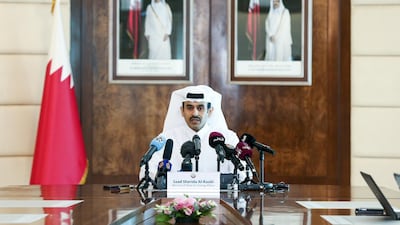Qatar's decision to withdraw from the Organisation of the Petroleum Exporting Countries (Opec) sent ripples through markets yesterday and at first glance appears largely symbolic. Qatar is among its smallest oil producers, pumping some 609,000 barrels per day (compared to the UAE's 3 million bpd and Saudi Arabia's 11m bpd), giving it a relatively small voice within the group. Thus Opec's members should not fear its departure on January 1.
However, such an analysis ignores the geopolitics – and economics – at play. The move comes 18 months after Saudi Arabia, the UAE, Bahrain and Egypt severed ties with Doha over its support for terrorist and extremist groups and at a pivotal moment for multi-lateralism in the region. The GCC bloc, which includes Qatar, is striving to collectively enhance security and prosperity – while constraining Tehran – and will hold a critical annual summit in Saudi Arabia this month. Meanwhile, the so-called Arab Nato, which aims to handle regional security and comprises GCC countries, Jordan and Egypt, backed by the US, remains a distinct possibility. Qatar is further distancing itself from this multilateralism, choosing to pursue its own interests at the expense of regional unity. The decision to pull out of an organisation it has been part of since 1961 closes the door on yet another arena of dialogue and calcifies its opposition to Saudi leadership in the region.
In announcing the decision today, Qatari energy minister Saad Al Kaabi both denied it was politically motivated and at the same time criticised Opec's dominance by an unnamed single nation – a thinly veiled swipe at Riyadh. Mr Al Kaabi said Doha would now focus on increasing its gas production from 77m to 110m tonnes annually. Qatar is already the world’s largest exporter of liquefied natural gas and the timing of its new strategy raises questions about the state of its finances, as the isolation from its neighbours continues to bite economically and with a World Cup on the horizon to pay for. It also demonstrates how the battleground has shifted to include energy. Until now this has been left relatively untouched by the regional crisis.
Opec countries comply with oil production quotas established by the group, so outside of it, Qatar will be able to produce at whatever level it chooses. Mr Al Kaabi promised that it would soon "make a big splash in the oil and gas business", echoing Doha's pursuit of self-aggrandizing but ultimately self-defeating global headlines in sport, art and the acquisition of trophy assets.
The Arab quartet has made clear that relations with Qatar can be normalised only if Doha curbs its destablising influence in the region. By pulling out of Opec at this moment, Doha has once again shown its truculence and provided yet another blow to unity for the region.

